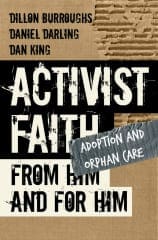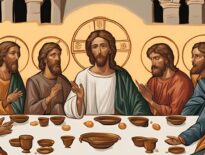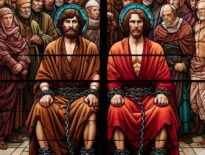the reading
To the leader: with stringed instruments. A Psalm of David.
1 Answer me when I call, O God of my right!
You gave me room when I was in distress.
Be gracious to me, and hear my prayer.
2 How long, you people, shall my honor suffer shame?
How long will you love vain words and seek after lies? Selah
3 But know that the Lord has set apart the faithful for himself;
the Lord hears when I call to him.
4 When you are disturbed, do not sin;
ponder it on your beds, and be silent. Selah
5 Offer right sacrifices,
and put your trust in the Lord.
6 There are many who say, “O that we might see some good!
Let the light of your face shine on us, O Lord!”
7 You have put gladness in my heart
more than when their grain and wine abound.
8 I will both lie down and sleep in peace,
for you alone, O Lord, make me lie down in safety.
the sermon
In these weeks after Easter Sunday, we celebrate the resurrection with shouts of, “Alleluia! Christ is risen!” Followed with the response, “The Lord is risen indeed! Alleluia!”
We have reason to celebrate as we remember the day that Jesus beat death and secured salvation for all who would believe.
But if we’re honest with ourselves, sometimes we have days when it doesn’t really feel like it. Sometimes life can beat us down to the point where saying this feels more like we’re trying to convince ourselves that it’s true.
Have you been there and felt that way? Or is it just me?
I know that I’ve had my share of moments in life when I wonder if He’s there, or if He actually cares about what I’m going through.
In particular, when my 17 and half month old son was diagnosed with Type 1 Diabetes (the autoimmune kind), I had many nights that I was afraid to fall asleep in case something happened and he needed me. I’ve certainly had times when I questioned the very existence of a “loving” God.
And it’s not just big, life-changing events like that. But there are times when life just seems to creep up on me and gets me losing sleep and feeling the pressure.
Bishop Justin talked about Thomas’ doubt last week. And all of our readings today have this tension of dealing with unbelief, doubt, and fear.
In particular in the Gospel reading for today (in Luke 24), Jesus comes along offering a “Shalom (peace) be with you,” and the disciples’ reaction was fear and doubt.
But the reading that I really want to explore is the Psalm appointed for today.
psalm 4 overview
Psalm 4 is the second of five individual laments of David that we get in the beginning of the Book of Psalms, and it deals with finding peace in times of trouble. (If you have a Bible, go ahead and turn to it, or you can find it in the Psalter in the Book of Common Prayer starting on page 587.)
Unlike some other Psalms, like Psalm 3 before it, this one doesn’t have a heading that tells us the circumstance during in which it was written. Psalm 3 tells us that it’s a, “Psalm of David, when he fled from his son Absalom.”
If you need a reminder, that story can be found in 2 Samuel 15. But in a nutshell, Absalom festered in hatred for a couple years over some pretty extreme abuse in the family that went unpunished, eventually leading him to kill his half-brother (the violator), and then come after his dad to subvert and take over the entire kingdom.
Psalm 3 was one of these laments written by a deeply troubled David while he was on the run and watching his family and the kingdom God entrusted him with fall apart before his very eyes. You can say he was having a bad day.
And many scholars believe that Psalm 4, our reading for today, was written during that time as well.
In fact, because of parts of it like in verse 8 where it says, “I will both lie down and sleep in peace,” many believe it was a sort of evening prayer that David wrote to bring peace at the end of yet another difficult day.
about psalms of lament
As we look at this, it’s helpful to understand the dynamic that’s common to psalms of lament. They tend to have a similar flow. They go something like this…
They usually start with an address and complaint… Like when David starts off with, “Answer me when I call, O God!” As if God is supposed to be there waiting for David’s next instruction. But this is where we see whatever misery or difficulty or problem the writer may be experiencing.
Sometimes it can be physical pain, and other times it can be mental stress. Regardless of the type of trouble, these are usually marked by an all-out honesty and transparency with God about what the writer is going through.
And while I’m here, let’s talk about how important it is to not minimize the mental.
CS Lewis said,
“Mental pain is less dramatic than physical pain, but it is more common and also more hard to bear. The frequent attempt to conceal mental pain increases the burden: it is easier to say ‘My tooth is aching’ than to say ‘My heart is broken.’”
In this Psalm, we see David in great distress, and concerned for things like his reputation (which Absalom was destroying). He’s having the kinds of problems that keep him up at night.
Then an interesting thing happens in these laments after the address and complaint. They start to cycle through a flow of other elements…
- Trust – Immediate expression of trust in the Lord.
- Deliverance – Cry out to God for deliverance from the situation.
- Assurance – Assurance that God will deliver.
- Praise – Offer of praise, thanks, and honor to God for His blessings.
We see some of that in Psalm 4 with statements like…
- v3 – But know that the Lord has set apart the faithful
- (also) v3 – The Lord hears when I call to Him
- v5 – Offer right sacrifices, and put your trust in the Lord
who can show us any good?
Then there’s this incredible statement in verse 6. Some translations show it in some form of exclamation, but many translations phrase it as a question, like this…
There are many who say, “Who will show us some good?”
David offers an answer to the question, but it’s different from what our culture would tell us today.
Walter Brueggemann, a great scholar and theologian, says that the primary narrative in the United States is “therapeutic, technological, consumerist militarism.”
By saying it’s “therapeutic” he’s pointing at, “the assumption that there is a product or a treatment to counteract every ache and pain and discomfort and trouble, so that life may be lived without any inconvenience.”
By saying “technological” he believes, “the assumption that everything can be fixed and made right according to human ingenuity.”
It’s “consumerist” because, “we live in a culture that believes that the whole world and all of its resources are available to us without regard to the neighbor.”
And by “militarism” he’s saying that “U.S. exceptionalism … serves to protect and maintain a monopoly that can deliver and guarantee all that is needed for the therapeutic, technological, consumerist society.”
So when we ask, “Who can show us any good?” our culture has us looking everywhere…
except God.
As if we can figure it out all on our own.
But David points to a different source by saying (v. 6b-7)…
Let the light of your face shine on us, O Lord!
You have put gladness in my heart
More than when their grain and wine abound.
David is even calling out the fact that material prosperity has nothing to do with true peace.
our modern laments
One of the things that not many people realize about these psalms of lament is that there are more of them in the Book of Psalms than any other type, including psalms of praise and thanksgiving. They account for somewhere over 40% of all of the psalms!
And it’s important for us to recognize that.
We need to know that lament is an important part of our walk with God. Not only is it allowed, but it’s necessary!
We’re allowed to express our frustration, hurt, and even anger to God. And sometimes, rightly or wrongly, we direct it at him too. And that’s okay.
And actually, the very fact that you’re expressing your complaint towards God is itself an act of trust… that you know He’s there listening to you!
But David gives us a great model for how we should always release our feelings to God, and then turn that into trust, knowing that He always makes a way for us to experience that “shalom,” the peace we need and are constantly looking for.
final thoughts
Our reading in 1 John today says this…
See what love the Father has given us, that we should be called children of God; and that is what we are.
If we believe that God is who He says He is, then we can trust that He’s going to take care of us. Jesus made that way possible.
Like David, we will face trouble. But we need to never forget that we have a loving Father who calls us His own and will take care of us and meet our every need.
At the end of the day, like David, we should be able to say,
I will both lie down and sleep in peace;
for you alone, O Lord, make me lie down in safety.
So when fear and doubt and stress and pain come our way, may we always find the words to express it to the Lord. May we find the ways to pour out all of our troubles on Him. And in doing so, may we find Him, faithfully there caring for us in whatever way we need it. Amen.





0 Comments